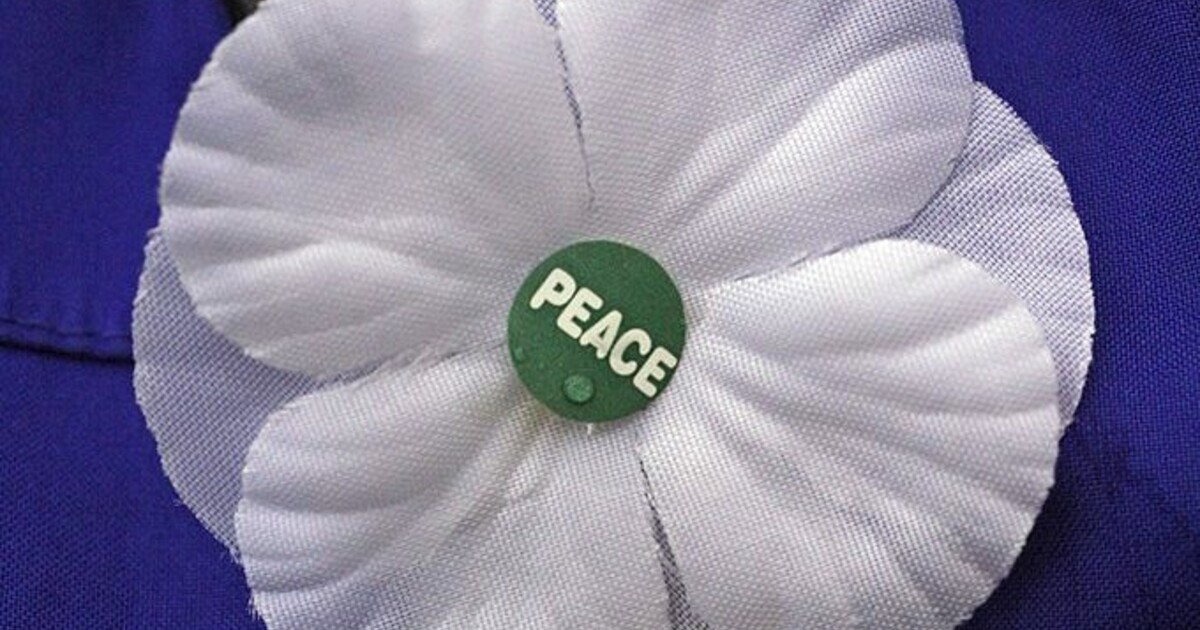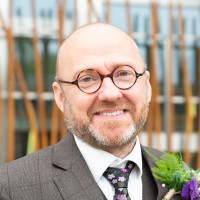The Scottish Government should mark Armistice Day by cutting all ties with the arms industry

Patrick Harvie, Scottish Greens’ co-convener, explains why he wears the white poppy and issues a challenge to the Scottish Government and the Royal British Legion to end their relationship with weapons manufacturers.
As we approach the 100th anniversary of Armistice Day, I want to say something not only about why I choose to wear a white poppy and what this means, but also about what we would lose if remembrance ceases to be a shared moment between people whose values are different.
This is important because many still believe that wearing the white poppy is a controversial act; a point of view that’s nurtured by provocative headlines, such as, “Is it wrong to wear a white poppy?” asked by the BBC.
Armistice Day. Remembrance Day. Poppy Day. Call it what you will. But if this annual event is to be a shared moment for our whole society then it must bring together people whose values differ, those who might chain themselves to the railings outside Faslane as well as those who might be found in uniform on the other side of the fence.
For generations, people have gathered together in remembrance on 11 November, the anniversary of the cessation of hostilities in 1918, or on the following Sunday. But the feelings people have about this have always differed and over recent years a note of intolerance has crept in. It often seems that a minority of people want this moment to become one of enforced jingoistic patriotism, or even a celebration of militarism, rather than solemn remembrance.
Within just a few years of the poppy’s first use as a symbol, there were already some concerns being expressed. Indeed some early remembrance events were even protested by former soldiers. Nobody disagreed with the first imperative of remembrance, the desire that we must “Never forget”. But the feeling grew that the other shared determination just after the war was already being sidelined – not only “Never forget”, but also “Never again!”
Some people suggested adding the words “No more war” to the poppies produced by the Royal British Legion and other veterans’ groups, but this didn’t catch on. Then in 1933 the first white poppies were distributed by the Co-Operative Women’s Guild, with the Peace Pledge Union taking the project on shortly after that. They have been produced ever since, partly as a sign of commitment to peace and refusal to glamorise war, and partly as an act of remembrance for all the victims of war, rather than only the military from our own country and its allies.
Another factor that leaves me uncomfortable with the Royal British Legion’s poppy appeal is its history of involvement with the arms trade. Weapons manufacturers such as Lockheed Martin, Thales and BAE Systems, which are directly implicated in profiting from the continuation of conflict and repressive violence, are surely legitimate targets for criticism from anyone for whom remembrance of the lives lost to war involves saying “Never again”.
Yet all these companies have actively promoted the RBL poppy appeal over the years or sponsored events with the support of the RBL, no doubt wanting to be seen to participate in the social ritual of remembrance, while their share values continue to depend on warfare and state violence.
Of course, the Scottish Government also has a disturbingly cosy relationship with arms dealers; funding companies such as Raytheon, who have been implicated in alleged war crimes carried out by the Saudi regime, with significant sums of public money.
Green MSPs revealed this year, through Freedom of Information requests, that the Scottish Government spent £1.2m on supporting companies actively involved in the arms trade in 2016-17 alone.
On this, the 100th anniversary of armistice, it would be fitting for the Scottish Government and the Legion to mark it by distancing themselves from the weapons manufacturers whose profits depend on the continuation of war and the creation of ever more victims both here and around the world.
If we want our act of remembrance to be meaningful then let us make it inclusive and let’s try not only to embody a spirit of “Never forget” but also to find the courage to say “Never again!”
This article first appeared in The Herald.
